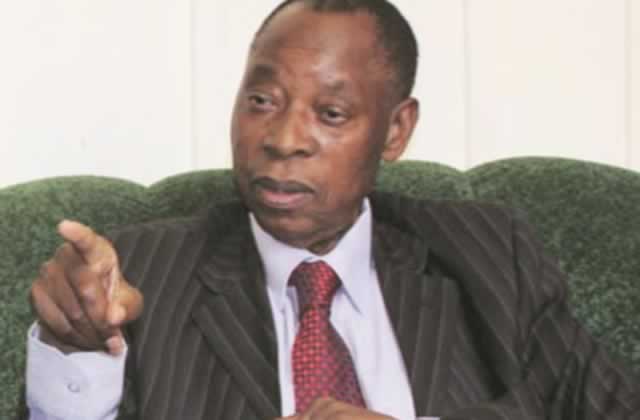The struggle for land in Zimbabwe

Lovemore Ranga Mataire The Reader
It is difficult to fault Dr Muchemwa’s narrative for every statement is backed by historical or archival footnotes. Actually, most of the material is derived from writings by white historians or writers and the end result is a serious indictment of colonial dispossession of indigenous Zimbabweans of their God-given land.
Retired Brigadier-General Dr Felix Ngwarati Muchemwa is a unique figure in the narrative history of Zimbabwe. He was one of the few young Zimbabweans endowed with an exceptional intellect the racialised Rhodesian system could not help but marvel at.
Born on April 22 1945 in Mhondoro-Ngezi in a family of four boys and three girls, the young Muchemwa did his schooling at St Michaels Primary and Kutama Mission respectively where he obtained the best Ordinary Level results and later advanced to Fletcher High School on a fully sponsored government grant.
Good at identifying exceptional talent, the Rhodesian government quickly snapped the young Muchemwa by awarding him a full scholarship at Fletcher High School and thereafter enrolled at the University of Rhodesia in 1967.
The contagion effect of the volatile political milieu at the then University of Rhodesia was to soon catch up with the young Muchemwa who in 1969 was elected president of the Students’ Representative Council in which capacity he led a series of students’ demonstrations against the white establishment.
Angered by his ‘ungratefulness’, the Rhodesian system expelled him from the university and he became a banned individual in Salisbury, forcing him to leave the country to further his studies in England in 1970.
In 1973, he qualified with an MDChB at Birmingham University and immediately obtained an FRCs (Glas) (Part One) in May 1975. He later joined the prestigious Birmingham Department of Anatomy as a lecturer and researcher leading him to an MSc (Anatomy) at the end of 1976 after which he proceeded to join the surgical rotation within the Birmingham area in January 1977.
Given such a rich professional and personal history, it was thus least expected of Muchemwa to abandon the seemingly comfortable life in England for the rugged and uncertain future of makeshift camps in Mozambique.
And when after independence, Dr Muchemwa sat down to write a book, one is bound to have an interest. The culmination of both his medical and military career was condensed in a book published late 2015 by Heritage Publishing House titled “The Struggle for Land in Zimbabwe (1890-2010)”.
Far from the usual autobiographical monologues of the struggle shared by people like Ndabaningi Sithole, Maurice Nyagumbo, Vesta Sithole, Josiah Tungamirai, Simon Muzenda, Fay Chung, Edgar Tekere, Wilbert Sadomba and Dzinashe Machingura, Dr Muchemwa’s book is a scholarly work backed by several traceable footnotes and archival records.
This is a book which renowned author Alexander Kanengoni described as a masterpiece in reference to how the author meticulously traced the roots of land disparities in Zimbabwe.
Writing in the Patriot newspaper of October 29, 2015 under the headline; “Rtd Brig-General Muchemwa and our story” another critic, Munhamu Pekeshe, describes the book’s whole structure as a “forensic diagnosis of the land ownership crisis by a guerilla medical practitioner.”
The same point is also reinforced by prominent academic Dr Rino Zhuwarara, who penned the Preface, in which he hails the text as the most comprehensive story of the struggle for land ownership in Zimbabwe told with a scope and depth that has not been witnessed be- fore.
Dr Zhuwarara contends that the book challenges the reader to question how it is possible to convert land ownership founded on the abuse of one section of humanity into an exclusive and inalienable human right for another section of humanity in Zimbabwe.
He further questions how it is possible to make the impoverishment and servitude of the blacks in Zimbabwe, the inalienable human right of the colonising white settler community and how it is possible for the West to view the correction of a crime against black humanity as an infringement of white settler “human rights” founded on that crime. In reading the book, one gets a clear picture of how the white Rhodesians converted a right of conquest into a human right for the conqueror.
The peculiarity of this book is in its comprehensiveness. Literature on the subject of land has hitherto only existed in fragmented form, as chapters in history books, as newspaper and academic articles, notes or reviews and oftentimes written from the perspective of the dispossessor and not the dispossessed. For the first time in Zimbabwe, the history of land has been clinically stitched together from one who was not only dispossessed and displaced from his God-given space but also participated in the repossession of that space through the armed liberation struggle.
It is difficult to fault Dr Muchemwa’s narrative for every statement is backed by historical or archival footnotes. Actually, most of the material is derived from writings by white historians or writers and the end result is a serious indictment of colonial dispossession of indigenous Zimbabweans of their God-given land.
Both scholars and casual readers will find the book’s style, structure and plot easy to follow for it’s divided into 18 chapters with all abbreviations clearly spelt out. It traces how the colonial regime grabbed land from the indigenous people from the 16th century to present day 2010.
It seems Dr Muchemwa was inspired by the need to correct certain historical lies peddled by white Rhodesian voices who, 35 years after independence, seem to have dominated and polluted Zimbabwe’s historical trajectory.
The situation has been worsened by palpable reluctance by black participants to share their experiences. But now it seems Dr Muchemwa has laid the groundwork for more productions of history from the point of view of those who were victims.
The most critical thing about Dr Muchemwa’s narrative is that it is a story that blacks can identify with something that Kanengoni says “Our Story”. But how is this book a black man’s story?
It is our story because it goes far back to the Great Zimbabwe State where the name Zimbabwe was coined by people who shared the same vision for the land as most black people today. It is our story because it talks about our people, their past, present and their future.









Comments